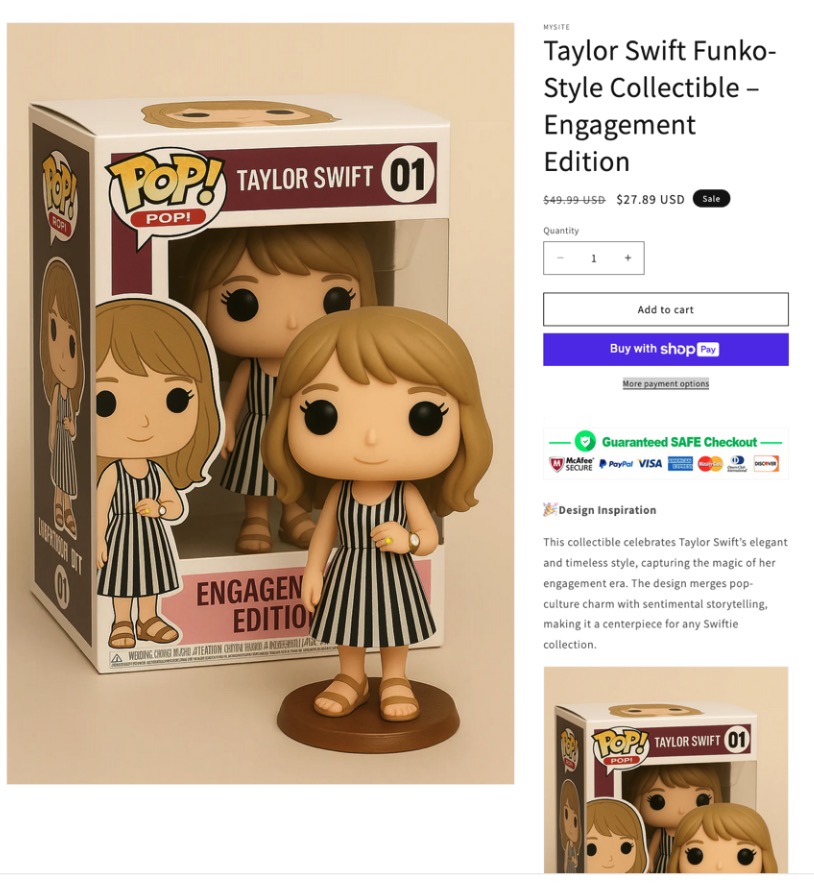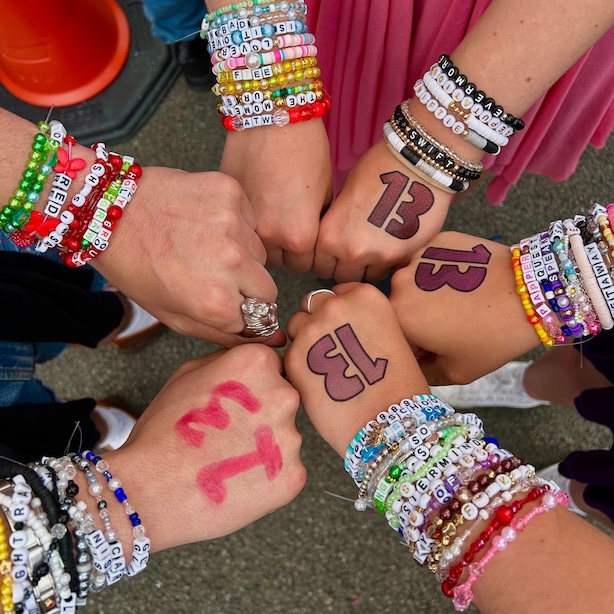When news of Taylor Swift and Travis Kelce’s engagement broke recently, fans around the world celebrated this real-life love story. Unfortunately, cybercriminals saw something else entirely: a golden opportunity to exploit millions of devoted Swifties and NFL fans through sophisticated scams that blend AI technology with classic fraud tactics.
The Perfect Storm for Scammers
The engagement of two mega-celebrities creates an ideal environment for scammers. With millions of fans eager for content, merchandise, and insider information about their favorite stars, fraudsters have crafted elaborate schemes that prey on this enthusiasm. What makes these recent scams particularly dangerous is their use of cutting-edge AI technology that makes fake content increasingly difficult to detect.
Deepfakes Flood Social Media
McAfee threat researchers have identified a deepfake video circulating across social media platforms, all capitalizing on the engagement buzz. These AI-generated videos, some featuring a likeness of Selena Gomez, are commenting on the engagement, overlayed on video clips of Taylor Swift, but they’re entirely fabricated.

Figure 1 – Examples of deepfakes on social media
The sophistication of these deepfakes is concerning. They feature realistic facial movements and convincing audio that can fool even discerning viewers. Fortunately, McAfee’s Scam Detector technology has been successfully identifying these fraudulent videos, alerting users with notifications that read “Deepfake detected” and advising viewers to “take a moment to double-check if the video is real and accurate.”
Deepfake videos can serve several malicious purposes:
- Spreading misinformation about the engagement or the celebrities involved
- Generating ad revenue through increased views and engagement
- Building credibility for other scam operations by creating fake celebrity endorsements
The Fake Merchandise Gold Rush
Perhaps even more concerning than the deepfakes is the explosion of fraudulent merchandise capitalizing on the engagement. Scammers have quickly pivoted to creating fake commemorative items, with one of the most prominent examples being counterfeit “Taylor Swift Funko Style Collectible Engagement Edition Dolls.”


Figure 2 – AI-Generated Funko Style Doll with AI-Generated Text
McAfee threat researchers recently investigated a website selling unauthorized Taylor Swift and Travis Kelce Funko Pop-style dolls. At first glance, the site appears legitimate, complete with professional product photography and detailed descriptions. However, closer inspection reveals several red flags:
AI-Generated Product Image: The most telling sign of fraud lies in the product images themselves. Researchers discovered that the Funko doll boxes contained misspelled words and incorrect text placement – classic indicators that the images were generated by AI rather than photographed from real products. These imperfections are common in AI-generated content, where text rendering often fails to produce accurate spelling or realistic placement. However, AI image generation tools are rapidly improving and are getting better at generating text.
Fraudulent Security Badges: The website goes to extraordinary lengths to appear legitimate, even displaying a fake “McAfee Secure” badge. This is particularly brazen, as scammers are literally using McAfee’s trusted brand to legitimize their fraudulent operation. Consumers should always verify security badges by clicking on them to ensure they lead to official verification pages. The McAfee SECURE seal was replaced by TrustedSite in 2013.
Too-Good-To-Be-True Pricing: The dolls are priced at $26.98, marked down from $49.99 – a classic pricing strategy designed to create urgency and the perception of a great deal.
The Broader Impact of Celebrity Exploitation
These scams represent more than just financial fraud; they’re part of a larger ecosystem of misinformation and exploitation that damages both fans and the celebrities themselves. When deepfakes spread false information or when unauthorized merchandise floods the market, it can:
- Confuse fans about authentic vs. fake content
- Damage celebrity reputations through false associations
- Undermine legitimate businesses selling official merchandise
- Erode trust in social media content generally
Protecting Yourself from Engagement-Related Scams
As these scams continue to evolve, consumers need to stay vigilant. Here are key steps to protect yourself:
For Social Media Content:
- Look for verification indicators: Many platforms now include deepfake detection warnings
- Check the source: Verify that celebrity content comes from official, verified accounts
- Be skeptical of sensational claims: If content seems designed purely for shock value or clicks, question its authenticity
- Cross-reference information: Check multiple reliable news sources before believing or sharing celebrity news
For Merchandise Purchases:
- Buy only from official sources: Stick to verified celebrity merchandise stores or authorized retailers
- Examine product images carefully: Look for spelling errors, misaligned text, or other signs of AI generation
- Verify security badges: Click on security indicators to ensure they’re legitimate
- Research the website: Check domain registration dates, customer reviews, and business information
- Be wary of limited-time offers: Scammers often create artificial urgency to pressure quick purchases
The Technology Arms Race
The Taylor Swift and Travis Kelce engagement scams highlight a broader trend in cybercrime: the democratization of sophisticated fraud tools. AI technology that once required significant technical expertise is now accessible to everyday scammers, making it easier than ever to create convincing fake content.
However, the same technology enabling these scams is also being used to combat them. Detection tools like McAfee’s Scam Detector are becoming more sophisticated at identifying AI-generated content, providing crucial protection for consumers.
The Taylor Swift and Travis Kelce engagement should be a celebration of love and happiness. Instead, it’s become another reminder of how quickly scammers adapt to exploit major news events and celebrity culture. By staying informed about these tactics and maintaining healthy skepticism about online content, fans can protect themselves while still enjoying legitimate coverage of their favorite celebrities.
Remember: if something seems too good to be true – whether it’s exclusive celebrity content or amazing merchandise deals, it probably is. In the age of AI-generated scams, a moment of caution can save you from becoming the next victim in this digital love story gone wrong. The best way to show love for Taylor Swift and Travis Kelce isn’t by clicking on suspicious links or buying questionable merchandise – it’s by being smart, careful consumers who don’t give scammers the attention and money they’re seeking.












